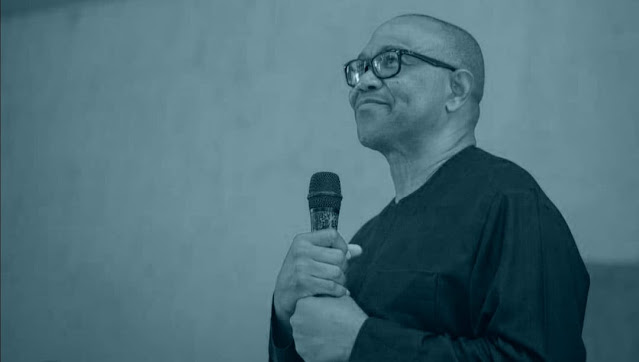Obi Criticizes Tinubu's Benue Visit, Decries Lack of Compassion and National Sensitivity
Peter Obi, former presidential candidate of the Labour Party, has strongly criticized President Bola Tinubu’s recent visit to Benue State, describing the trip as tone-deaf and emotionally disconnected from the tragedy that had befallen the region. Obi accused the President of turning what should have been a solemn moment of grief into a stage-managed political display, filled with fanfare and festivities inappropriate for the gravity of the situation.
The President’s visit came in the aftermath of a horrific attack in Benue which claimed over 100 lives. Another disaster, flooding in Niger State, also reportedly resulted in a similar number of deaths. Both incidents have left communities devastated and families shattered, with survivors calling for justice, support, and meaningful action from the nation's leadership.
Voicing his frustration through a post on his official X handle on Thursday, Obi highlighted what he described as a troubling shift in how national tragedies are being treated. Rather than addressing the somber reality of mass killings and displacement, he noted that the President’s visit to Benue felt more like a campaign rally than a condolence mission.
Obi expressed disappointment over the atmosphere during the presidential visit, saying that nothing about the event reflected mourning. He was particularly critical of the optics. President Tinubu’s choice of celebratory attire and the presence of music, cheering crowds, and choreographed performances, in Obi’s view, completely missed the emotional weight of the moment.
“Instead of quiet reflection and solidarity with grieving families, we witnessed a parade. Children who have lost parents and classmates were made to stand in the rain and sing for the President. What should have been a moment of collective mourning became a public show,” Obi lamented.
He was especially displeased with the Benue State Government’s decision to declare a public holiday to mark the President's visit. Obi questioned the appropriateness of pausing essential activities only to arrange entertainment and symbolic ceremonies, rather than fostering an atmosphere of unity and prayer for the dead.
Citing international examples, Obi pointed out how world leaders respond to national tragedies with quiet strength and respectful presence. He referenced South African President Cyril Ramaphosa’s visit to Mthatha following deadly floods. According to Obi, there were no bands, no pre-arranged cheers, just a somber acknowledgment of loss and the need for decisive action. Similarly, he recalled Indian Prime Minister Narendra Modi's visit to the site of a tragic crash, where he simply mourned without public displays or staged welcomes.
“That is what leadership looks like during moments of collective grief,” Obi stated. “Silence, presence, and meaningful steps forward.”
He warned that the growing trend of politicizing tragedy is eating away at the nation’s moral foundation. When people lose their lives in large numbers and those moments are turned into orchestrated events for political optics, it signals a deeper problem within the national psyche.
“These were children, mothers, and fathers whose lives were ended senselessly. Their blood cries for justice, not celebration. When condolence visits are reduced to carnivals, we risk losing our nation's soul,” he said.
Despite the criticism, President Tinubu did attempt to address the crisis during his visit. At a town hall meeting in Benue, he directed security agencies to urgently track down and apprehend those responsible for the killings. Addressing the Chief of Defence Staff, General Christopher Musa, Tinubu emphasized the need for proactive intelligence and field-level accountability.
“We need to get our ears to the ground. Let’s get those criminals. Let’s get them out,” he instructed during the gathering.
Additionally, the President visited injured victims who are receiving treatment at the Benue State University Teaching Hospital. His entourage included high-level officials such as the Secretary to the Government of the Federation, Senator George Akume, and the Benue State Governor, Rev. Fr. Hyacinth Alia.
While the visit had all the components of an official response, critics like Obi argue that the essence of genuine leadership lies not only in words and directives, but in a shared sense of sorrow and human empathy.
The debate sparked by Obi’s remarks underscores a broader concern in Nigeria: the gap between government gestures and public expectations during times of crisis. As the nation continues to confront internal insecurity and humanitarian emergencies, citizens are looking for more than promises. They are calling for authentic leadership rooted in compassion, dignity, and action.













![Content Creator Angelica Kelechi Speaks Out on Alleged Sexual Assault at Khloe Abiri’s Spa [VIDEO]](https://blogger.googleusercontent.com/img/b/R29vZ2xl/AVvXsEgQStip4cn2DAOvQ2hNFU30OAFWoxfQIDOnStd0uVgwwxKrFAQYYvtFni6QV04OGP8dyKk5TCAhXM5es9linl1ClhjPzaazz2tTt0LmJ5lFVe5202o2McF9QROT1v2hEyNTdY-M1KRuLTY6OqqysKNfcsY5bCtwCIP8wEQ4AXcfQfTaXWWZiixqf82NDH5a/w72-h72-p-k-no-nu/abiri-khloe123.jpg)






0 Comments
Hey there! We love hearing from you. Feel free to share your thoughts, ask questions, or add to the conversation. Just keep it respectful, relevant, and free from spam. Let’s keep this space welcoming for everyone. Thanks for being part of the discussion! 😊